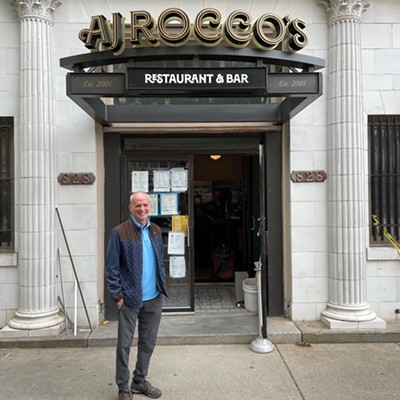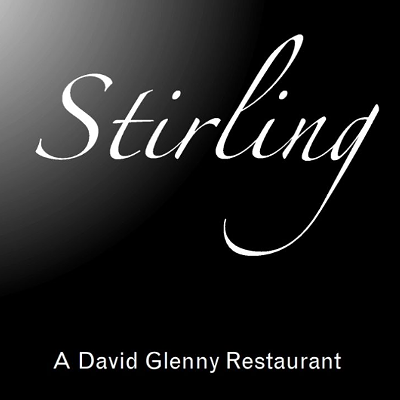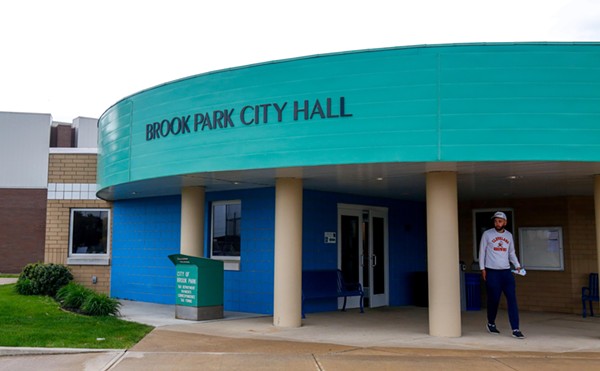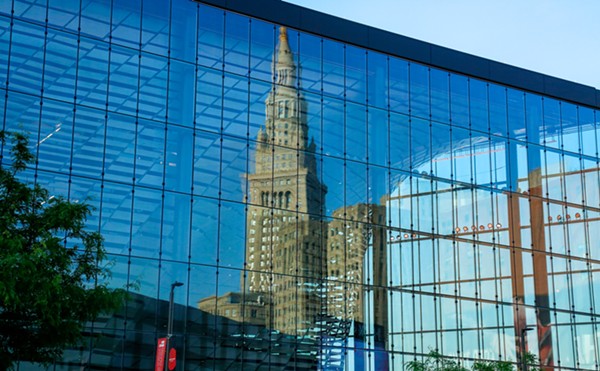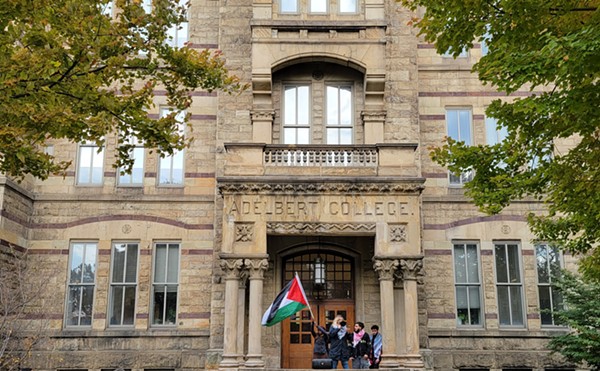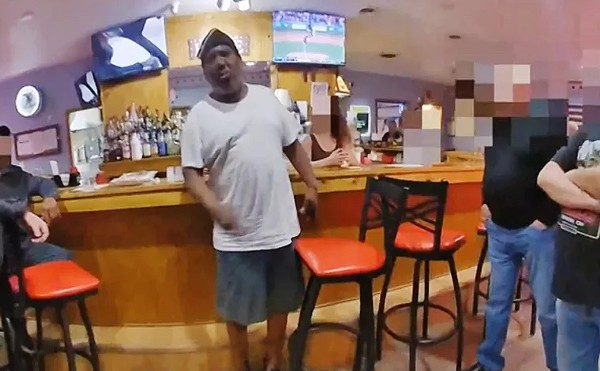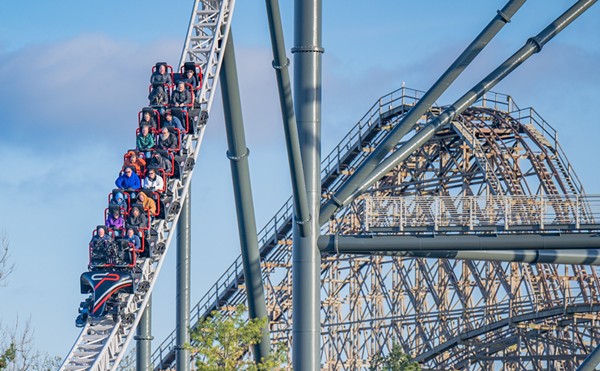"It was the most perfect day," says Underwood, a sleek, slender man with a bubbly laugh, recalling that October Saturday. "Blue sky, beautiful." They each had a best man. "Afterwards, we went to the art museum and took pictures."
The couple, who met in Bible study at Mt. Zion Fellowship of the Brethren on Northfield Road, had been dating for three years. During that time, they'd spent many late nights sitting on the porch, holding hands and talking.
"I liked his spirituality," Underwood, 38, says of Toles. "I liked the fact that we thought the same way, believed the same way -- or if we didn't, we weren't miles away from each other."
Toles, 35, a computer technician and classically trained pianist with a neatly trimmed mustache and close-cropped hair, treasured Underwood's openness and sense of humor. "He's very loving, very romantic, and honest about everything."
The elders at Mt. Zion, however, weren't so thrilled. Though the couple had taken pains not to advertise it, the church had gotten wind of the ceremony. About a month before, a church elder called Toles out of his pew during choir practice, escorted him to the office, and closed the door.
"He asked me, 'Is it true you are having a marriage ceremony?'" When Toles answered yes, He said, Well, then I have to ask you to step down from the ministry.'" Toles was being kicked out of the choir. "I left that evening and never went back. I was hurt very much."
He and Underwood knew everyone in the congregation and considered the church "a comfortable place for African Americans who were gay," says Toles. The sermons "weren't the typical bashing-and-fire-damnation-
you're-going-to-hell. The pastor there mentioned on a couple of occasions that he felt that people could be born gay. I liked him, because he always spoke the truth."
Though Mt. Zion, a traditional black church, was quietly considered gay-friendly, Pastor Ron Williams had never actually condoned homosexuality. In one of his sermons, Williams had said, "You shouldn't want to be gay, just like a person who is born retarded doesn't want to be retarded," recalls Toles. "Which was a little confusing for some people, but they pretty much just left it alone."
After Toles's departure, Underwood, the grandson of a Pentecostal minister, also left the church. "I felt that I had to support my partner, and that we had to look unified."
There was no mass exodus of gay members from Mt. Zion, however. Maybe that's because if they left, they'd have nowhere to go.
"If you're black and gay and talk about it, as far as an open-and-affirming black church -- nada," says Chris Coleman, a gay black man. "There are two things you're not supposed to talk about in church: AIDS and homosexuality. And these are two things that really need to be addressed in African American culture."
"In a white church, you see two men sitting together, and nothing's said," says Clifford Blake, a 59-year-old gay black man who grew up on Cleveland's East Side. "In a black church, people are constantly up under each other. You see two black men together, and it's the talk of the day."
Conspicuously lacking is the use of the word "gay." "I don't think we had a word for it," says Tracy Jones, a straight black woman who works for the AIDS Taskforce. "It was 'She's that way.' Or 'He's different.' 'He has friends.' Or 'They've been roommates for years.'"
Gay white people have lost jobs, friends, and even their lives because of their sexuality; gay black men have it worse. On top of racial discrimination, they face being shunned by their own people.
Black ministers, those torchbearers of the civil-rights movement, regularly condemn homosexuals. Black men are expected to be macho and stoic, to conform to some ideal über-heterosexual role as disciplinarian and provider. If they stray from that, they bring shame upon their family.
Add to that a gay community that doesn't always have the best interests of minorities in mind, and gay black men have everything to lose. Coming out puts them "at risk with their community, their church, and their family in one fell swoop," says Jones.
Maybe that's why so many black men are "on the down-low" -- putting on a straight face for the world, but having anonymous sex with men on the side. If you don't have a word for it, it doesn't exist. At least, not until the HIV test comes back positive.
At Club Out, a gay nightspot on St. Clair Avenue with a primarily black clientele, men and women dressed in church-casual work their way through line dances such as the Cha-Cha Slide, Shake What Yo' Mamma Gave Ya, and the Cleveland Shuffle.
"Okay, all of you beginners, off the dance floor," shouts DJ Robbie Rob, who spins every Saturday night. "We only want the pros."
The triangle of bodies thins to a few brave souls. They're led by a clean-cut man in a bolo tie, whose paunch says he's about 45. His face is a mask of concentration, and sweat beads form constellations on his skin. As the music gets faster, his feet get fleeter, flying through the disco-cowboy moves. He's not here just to check anybody out or to drink himself silly. He's here for that lift-off-the-ground feeling that comes when it's Saturday night and you know all the steps.
The music changes to a gospel house mix, and everybody's back on the floor, mingling. Women in blue jeans and shiny shirts gossip, sip beers, and try to do a little dirty dancing -- but usually end up laughing. They could be at a wedding or a family picnic.
Coleman, a stocky man with startling blue eyes, studies the scene from the second-floor balcony, leaning over the rail. He's combing the crowd for his "gay sister" -- a woman from high school who's related to him only by sexual preference (he likes men; she likes women).
"This is the one place in the community where you can come out and see your friends," he remarks over the din of the sound system. "You spend nine to five in a straight world, with your straight friends, and look forward to Saturday night.
"It's a really different experience, as far as the gay community goes. It's less rigid, less about trying to fit into a certain look, and more about the music and having a good time."
"Stand up, stand up for Jesus," clubgoers sing to the music. The lyrics, woven into a hip-hop backbeat, come from a traditional hymn regularly sung on Sundays.
Coleman turns from the crowd, his eyes alight. "See, this is how important church is to these people," he says. "It affects everything."
At four in the morning, the club closes, and the party people retire to Faces, an after-hours joint nearby. The music and camaraderie continue for several more hours. As dawn breaks and the rest of Cleveland dons its Sunday best, a small corner of the black gay world has already been spiritually fed.
The most egregious gay-bashing in Cleveland's black community often comes from the pulpit. Stories of ministers singling out homosexuality as the basest, most deplorable of sins are not hard to find.
"Homosexuals were always the worst," says Vanessa Dawson, a black lesbian whose father is a minister. "Worse than murderers."
Adds Coleman: "You have lots of congregation members who are dealing with [homosexual] issues. But the acceptable thing in the African American church is not to talk about it. You can be gay, as long as they know you're not engaging in or practicing that type of orientation."
Coleman, who's 34, won't easily forget that during the most difficult time in his life, his church provided no refuge. The hard times began when he was a senior at Bowling Green State University, finally dealing with his sexuality.
The only black member of a white fraternity, he had played the straight role well, dating women through his junior year. He was the first black officer in the interfraternity council, a Big Brother, and a volunteer for the Adopt-a-Grandparent program.
He excelled at his studies and made friends easily. "I was always the social guy at the fraternity, the person who could line up the party," he says. "I used that as a mask, to make myself feel comfortable."
But he couldn't keep it up forever. "I always felt like an outsider. I felt that there was no one else on this entire campus who was dealing with what I was dealing with." The fact that there were very few black students on campus, let alone black gay men, compounded his isolation.
As time passed, he found his gayness harder to suppress, even though his strict Baptist background didn't allow for "deviation."
A few months before graduation, he had an emotional breakdown. "In my brain, I had this fight going on," he says. "I thought I was being torn apart. I went into a deep depression. I went from being the big man on campus to not wanting to get up, not wanting to go to classes, becoming disconnected -- because of the sexual orientation thing.
"I remember being on the phone a lot with my mom, trying to share something with her about the stress that I was under, and not even being able to open up to her. But she knew something was really severely wrong with the way I was acting."
On weekends away from school, he returned to his home church in Sandusky, the place "where people brought you up, bought your Cub Scout cookies and your Junior Achievement things." But rumors of his homosexuality had spread around the church, and rather than being welcomed back, he was mocked.
Whenever Coleman arrived late, the minister would digress from the sermon already in progress. "As soon as I sat down, all of a sudden, the sermon got turned around to homosexuality, 'that which we view as wrong and sinful,'" says Coleman. "It was about damnation. You heard how wrong it was. There was a lot of Bible-quoting and 'A man should not lay with a man.' There were times I would just leave, because it was too much."
Though he now lives on Cleveland's West Side, Coleman occasionally still attends the church, just to be with his mom. "My mother knows I'm gay," he says. "I've told her, 'Hello, I'm gay.' She found my pictures of men at home. But to this day, she's still asking me, 'When are you gonna bring home a nice girl?' That's how ingrained and unacceptable it is in our culture."
Tracy Jones left her East Side Baptist church because she was disillusioned by the minister's tirades against homosexuals. A petite woman, Jones looks striking in bright color combinations that on most people would be a bad accident. Even though she's not gay, she refused to sit in silence while an elder riffed on the iniquity of man-love.
"It was a funky perspective," Jones says, especially when delivered before a choir that she estimates was 50 percent gay. "Not only that homosexuality was wrong, but for some reason, it was wronger than any of the other sins. More unforgivable than any other acts of immorality, like adultery. Their seats [in hell] were warmer."
No one, gay or straight, followed her lead out of the church. "Why do you continue to go there? He's an asshole," she said to a gay friend in the congregation. "He said, 'I don't pay attention to that. I look past that.'"
One black minister who preaches about the evils of homosexuality is the Reverend Vincent R. Miller of New Hope Baptist Church in Painesville. Some years ago, as a young, impressionable pastor, Miller was approached for counseling by three female church members who had engaged in a ménage à trois.
"They sat down with me and shared that they had been having a relationship with each other," he recalls. He thought they were friends. "I was naive. I thought it was nice."
No, they'd been sharing a bed together, they clarified. Surprised, he told them, "I would do anything I could to help them out of that damnable relationship. It's our belief that a homosexual has no real relationship with God. I do not seek to bash gays, but I let my congregation know what the Bible teaches."
All sins are "an abomination against God," Miller adds, noting that most black ministers in Cleveland share his fundamentalist views. But the Bible regards homosexuality as more of an abomination than other sins, he says. "Absolutely, it's worse. It's worse, because it is opposed to God's design for family and reproduction."
The Bible might be a textbook on how to live, but it has also been used to defend racial segregation. In the 1950s, Southern good ol' boys were fond of quoting Acts 17:26 and a passage in the book of Joshua that prohibited Israelites from mixing with Canaanites. They used the scriptures to argue that schools should remain segregated.
But Miller says he and the segregationists aren't in the same league. "God makes a clear declaration about homosexuality as a sin," he says. "There are more places than one in the Bible in opposition to homosexuality. Anyone who teaches -- or claims the Bible teaches -- that the races should be segregated is perverting scripture."
As for the lesbians he counseled, he believes all three are "still living an ungodly lifestyle. I don't think they had the will to change."
The Reverend Marvin McMickle of Antioch Baptist Church, one of the more liberal and visible black ministers in Cleveland, says discussions of homosexuality "don't come up" at his church. One might think they would, since, in its basement, the church runs the AGAPE program -- one of a handful of HIV-prevention programs in the nation established by a black congregation.
McMickle sings the praises of AGAPE in public speeches around the country. Yet he tells his flock that "all sexual conduct belongs inside a marriage." He says he considers homosexuality a sin.
"The scriptures teach that sexuality is God's gift to marriage," he says. "Taken outside of that, many hurtful possibilities can occur. Unwanted pregnancies, broken hearts from broken relationships, sexually transmitted diseases."
He also likens homosexuals to lepers in the Bible: people who should be openly "embraced," even though they're considered repulsive.
Hugs aside, such implied disapproval is still disapproval, says Jones. "The attitude of a lot of the black community is 'We're not pointing any fingers. We're just teaching what's in the Bible,'" she says. "That's not really encouraging you to be who you are in a safe way. If you don't identify with the term 'gay,' and you work to live in the straight African American world, with a same-sex relationship on the side -- that encourages public sex with strangers, it encourages not being monogamous, it encourages not being honest with your sexual partners."
While the Cleveland black churches struggle with the issue, the Reverend David Bahr -- the white, openly gay pastor of Archwood United Church of Christ -- is seeing more and more African American gay and lesbian couples on Sundays.
The first out UCC minister in Ohio, Bahr regularly performs commitment ceremonies for gay couples. "We do more African American lesbians than anything," he says. "It's so disheartening that not every church is welcoming. We wouldn't grow like we are if that was the case."
Dawson, a shirt presser, started coming to Archwood a year ago, bringing along her girlfriend, Yvonne Summers, who works in a factory in Akron.
"The first time I came here, it felt like home to me," says Dawson, a round-faced woman in her mid-30s. "I enjoyed it so much." Though she considers herself a spiritual person, she used to feel like a misfit on Sundays. She resisted putting on the frilly dresses and fancy shoes -- "my costume" -- and she dreaded the sermons, where her father, a Baptist minister, "was standing up there, screaming and talking about every topic he could to make you feel bad."
As her father ranted, he would mention "those men who sleep with men. I knew I was gay at a very early age, and I remember feeling awful, absolutely awful, having these thoughts and feelings. I thought there might be something bad about me."
When self-made interior designer Clifford Blake was young, the city was so racially divided that interracial dating was a good way for a gay black man to keep his family guessing. "My family didn't know any white people," says Blake, who grew up in the Quincy Avenue area. "You will find that most black men of my age dated white men because they knew [their sexual preference] would never get back to their families."
Coming out to his family and friends wasn't an option. "Whites come out to their families," he says. "Blacks don't. They don't want to bring them shame." In his community, being gay was associated with being uppity or weak, or with trying to be white.
"The black man was obligated to be upright and manly. It goes back to slavery," he reasons. "You had to be strong to survive slavery and to survive segregation."
Dawson recalls witnessing a gay male relative endure constant mocking from her family -- abuse that, as a lesbian, she wasn't subjected to.
"They got it rough," she says of black gay men. "Real rough. From my experience, the average black male has such an ego problem -- all that rough, tough, hardcore macho stuff -- that, when a homosexual man steps into the picture, I think [straight black men] feel threatened. If you don't fit, you're out."
"My gay mannerisms were more accepted by whites," Blake adds, referring to the fact that he didn't swear, play sports, or use street slang. "In school, I was called 'fag,' 'sissy,' 'queer.' I put on a social coat to enter society, and when I went home, that social coat was the wrong thing to wear around my peers. My being light-complexioned gave it even more of a slant."
Though he never told his family he's gay, "I would hate to think that they're that ignorant," he says. "They have met my friends. They know what type of rumors I have."
At church, where he holds a position of authority, "No one has asked me, 'Are you gay?' To that I would say, 'Are you committing adultery?' I'm a nice person. I pay tithes. It's not their business."
Among blacks of Blake's generation, the only way to "overcome" gayness was to "achieve something," Blake says. "If you became a doctor, doctor was put first, and gay took second place. I'm a trustee in my church, so that position becomes first, and my gayness becomes second."
He admits, though, that he doesn't like it when his minister includes homosexuality in her litany of evils. "I'm shaken by it, but I try to transform it into something else. That's her performance in church. Whoremongering is wrong. Homosexuality, in itself, is not."
Coming out can be especially hard for black kids raised by struggling single moms, says Coleman. "You're from the inner city, not of means, and you go up to your mom and say, 'Mom, by the way, while you're working 70 hours a day to make ends meet, I'm gay.' How's that gonna go over?
"Or, if you have a dad, he's the disciplinarian, the breadwinner. The last thing he wants to know is that his son is having sex with another guy."
For that reason, Coleman mentors gay teens of color for a group called Club 1722. It was started in 1999, after national statistics began to show AIDS as the No. 1 killer of young black men. The club's adult founders decided that minority youth weren't being reached by traditional channels, and they needed a safe, drug- and alcohol-free scene where they could interact.
At first, only a few teens came to the basement of the Lesbian-Gay Community Service Center on Detroit Avenue, but as word spread, they were soon lined up outside on Thursday evenings, waiting to get in.
In a basement rec room outfitted with couches, tables, and books, the teens chat, shoot pool, and practice vogue moves on a carpet remnant unfurled on the tiled floor. Their mentors -- seven or eight black gay adults in their late 20s and 30s -- talk and joke with them, though with the attentive reserve of chaperones at a high school dance. While the socializing is the "dessert," they also have to ingest their "vegetable": a weekly discussion that might include exchanges on HIV prevention, harassment problems at school and home, and exercises on building self-esteem.
"We try to teach them how to be not only comfortable with their sexuality, but also comfortable interacting with other gay youth," says Coleman.
The other kids gravitate around 16-year-old LaToya. She's loud and brash, but also kind and blessed with a wry sense of humor. She's been out at her high school for three years now, ever since she told a friend she's a lesbian. "You tell people, and you tell them not to tell people, and they tell everybody," she says. No one hassles her about it, though. "I'm a big girl," she says, referring to her stocky build.
Some of the other kids haven't confided in their parents yet. "They all need to just come out," LaToya says matter-of-factly, but adds that it might have been easier for her, because her mom's bisexual. "The boys have it a lot harder, because guys make fun of you."
Jay, a gangly teen with a thoughtful way about him, hasn't told his mom that he's gay. "No one knows about me," he says shyly.
"He's in the closet," helps his friend, Mo, an effeminate boy with big brown eyes.
"Don't dog me, Mo. What if my mother were to kick me out? You don't understand." He shakes his head. "We've got some gay people living next door. She calls them fags. I don't want her to know."
Getting kicked out of the house is a real fear. Phillip Lee is 20 now, but he came out when he was 15. Upon hearing the news, his Baptist-minister father (who called gay people "vulgar" in his sermons) made Lee move out.
"It was to be expected," says Lee. "My parents are religious. I knew what they would do." He lived with a friend for a year, working at McDonald's at night and attending high school during the day. "I did what I had to do to survive," he says. He's since reconciled with his parents.
Seventeen-year-old William, a pensive teen with a pudgy face and long eyelashes, isn't out at school, but he still gets hassled. Last year, two of his teachers had taken to calling him "gay" or "faggot" in front of his schoolmates because of his effeminate mannerisms, he says.
His mom, who came to grips with his sexuality after she found his stash of drag clothes and questioned him, went first to the teachers and then to the principal "and cussed them out," he says.
Even if they support their gay kids, black parents don't always have support themselves. Parents and Friends of Lesbians and Gays (P-FLAG) is "mostly a white thing," says Coleman.
Jane Daroff, a spokeswoman for the P-FLAG chapter that meets at Trinity Cathedral downtown, has noticed the lack of diversity.
"We have a very difficult time keeping parents of color," says Daroff, who helped found the chapter in 1985, after her son came out. "Every now and then, we have someone who's African American, but we can't seem to hold on to them for very long. They probably walk in and feel like they're one of a kind. And perhaps it's even harder to be gay in the black community than in the white community. It's another stigma."
Also at Club 1722, teens have the option of being tested for HIV. In the past year, two out of five tested positive.
Gay teens of color run in small circles, says Coleman, "so if one of them has HIV, a lot of them are gonna have HIV."
Twenty years ago in Cleveland's gay community, racial discrimination prevailed. Autoworker Scott Bibbs will never forget the time he was asked to show four forms of ID to get into a West Side gay club called Bayou Landing.
"I'm sorry, this is a private club," he was told. "You can't come in." His white friends had already been admitted, but they turned around and walked out. Then they called for backup -- a group named Black and White Men Together had a Discrimination Response Team. Gay men who felt they'd been discriminated against could phone the hotline with the time, place, and date of the incident, and a crisis unit of six white men and six black men would be dispatched to the scene. During their heyday, they mobilized about once a month.
As a group, they'd try to enter a club. When the discriminatory carding began, "You would ask for the manager and say, 'Excuse me, why are you doing this?'" says Bibbs. 'We're members of the gay community, and we won't tolerate this. We can make this known, and it will hurt your business.'"
Though the members of Black and White Men Together still host barbecues and march in the Gay Pride Parade, the Discrimination Response Team is a thing of the past. The carding situation at clubs has improved, says Bibbs, 50, a former department store "display queen" who now makes floor pans for cars at the General Motors factory. Besides, "The people manning [the team] got old and started not going out, and they never really passed the gauntlet."
The gay clubs still tend to be considered all-black or all-white. Belinda's Bar hosts black nights on Thursdays. Although the performers are dressed in full drag, the crowd looks as if it took a wrong turn on the way to the basketball game. Young men in jeans and basketball jerseys, heads swathed in do-rags or black nylon stocking caps, join in Electric Slide-like dances.
Marcia Lane, a butch dyke who's active in numerous gay organizations, says she can pretty much hang in any crowd. But the city is still very racially divided, she says -- a fact that the gay community isn't immune to.
This year, she was chosen as a grand marshal in Cleveland's Gay Pride Parade. But when the parade broke up and the festivities began, the racial division was palpable, she says.
"We kind of separated by race. I look at these people, and here we are in the same community, but we can never bring ourselves together as a whole."
Linda Malicki, executive director of the Lesbian-Gay Community Service Center, says the organization is making an effort to become more diverse, developing programming that targets minorities. "Mostly, it's been an organization that's been run by white people," she admits. "Which certainly wouldn't have appeared welcoming to people of color.
"If folks want that to happen, we need their help. We need people of color on our board."
Calvin "Kitty" Johnson, a former exotic fire dancer who's in his 60s, has found that his race causes him more problems than his sexuality. His encounters with discrimination usually involve a police officer stopping him and questioning him when he hasn't broken any laws.
Johnson was out at an early age. "I always had an effeminate air about me," he says. "And I was always getting beat up."
In high school, he learned to fight back -- first with his fists, then with his wits. He scratched one attacker raw with his long nails. "He still has the scars today," Johnson brags.
An older, tougher brother and an ideal after-school job also helped. "I gave out report cards," he says chattily. "These guys were so dumb, they thought I had ways of changing their grades, so they'd try to be my friend."
Still, Johnson tried to kill himself several times as a boy. His dad, known around their East Side neighborhood as "the meanest man alive," beat him regularly. Finally, Johnson ran away to Chicago and got a job in a straight show bar, where all the other strippers were women.
"I did a 45-minute act where I portrayed a slave in the fire, running through the jungle," he says. "But I had these gold charms made out of paper. That's how I escaped -- me and the paper became friends." He did that for 17 years. The crowds "didn't believe I was a man, and they didn't believe it was real fire. At least, [not] until the night the curtain caught fire."
Soon he started booking himself as Kirk Whitey, a male singer; the Fabulous Fabalini, a female singer; and Kitty Dawn, an exotic fire dancer. "I sold myself as all three acts and got paid for all three," he says, noting that the clubs were slow to catch on to the fact that it was actually a one-man show.
Expensive European wigs and Max Factor makeup helped him keep up the ruse, and he "made more in one night than most people made in two weeks."
Unlike Johnson, Koran Phillips, a cherub-faced 20-year-old, could pass for straight. Right now, he and his partner, Robert Burns, a.k.a. DJ Robbie Rob, are living together on the East Side. Phillips says he wants to be with Burns for the rest of his life.
"I love him," he says. "He's in my heart. I don't need anybody else."
Yet Phillips says he's not gay. At times, he considers himself bisexual, "but not really." His relationship with Burns, who's the head of the minority outreach program for the AIDS Taskforce, is his first with a man, he says. "If I wasn't with him, I'd be with a woman. I just happen to be in love with a man."
For the past year, Phillips says, his "gay family" has been the real family he never had. His dad was never in the picture, and as a kid he was passed around from relative to relative.
While Burns and Phillips build a life together, Wayne Toles and Charles Underwood are trying to find spiritual contentment.
A year after Toles was relegated to the back pews at Mt. Zion, they have not found a church where they both feel comfortable worshiping. Toles joined Trinity Church, where they had their ceremony. He admits it's been a bit of an adjustment.
"You have to understand, it's a totally different atmosphere than it was at Mt. Zion," he says. "The music is different, the way the worship service is run is different." Mt. Zion was more charismatic, with the "raising of the hands, the clapping, the shouting, the loudly praising the Lord, whereas the church I'm at now is quiet."
The Reverend Ron Williams of Mt. Zion declined comment for this story.
Underwood couldn't reconcile the reserved Trinity Church with his evangelical upbringing, so he joined a traditional "don't ask, don't tell" church with more theatrics.
Although they wish they could worship together, neither regrets leaving Mt. Zion.
"Let's get real," Underwood says. "They had a problem. We were out and in their faces. Two black men did something they all wish they had the opportunity to do. But they were afraid to do it."

